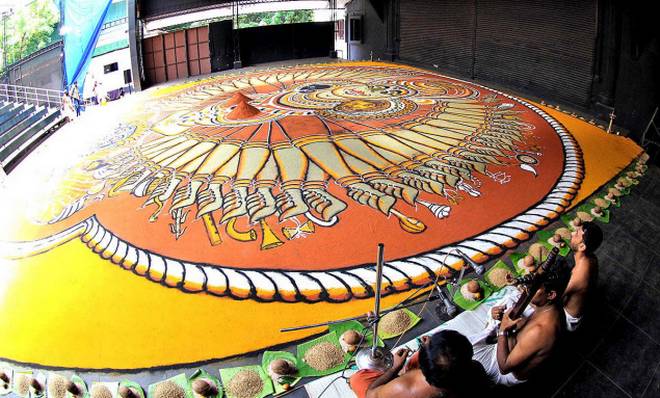Kalamezhuthu
This is a collection of articles archived for the excellence of their content. |
Contents |
What is Kalamezhuthu?
To a true artist, the entire planet is their canvas. This simple ideal can be viewed at its epitome during the 40 day Kalamezhuthu festivals held at Bhagavathy Temples across God’s Own Country. Maestros combine coloured powders to draw beautiful drawings on the floor, exalting and worshipping the great Gods of the land including Bhadrakaali, Ayyappan, Serpent or Vettakkorumakan. From temples to noble households, one sees these unique portraits accompanied by the Kalamezhuthupattu. These are erased at the end of the ritual, with the rhythms of various musical instruments like the ilathalam, veekkanchenda, kuzhal, kombu and chenda, acting as accompaniment.
Only natural products are used for the ritual to make the Kalam, also called the dholichithram or powder drawing. The pigments are extracted from plants- rice flour (white), charcoal powder (black), turmeric powder (yellow), powdered green leaves (green), and a mixture of turmeric powder and lime (red). The entire process can take up to 2 hours and it is sometimes even decorated with a canopy of palm fronds, garlands of red hibiscus flowers and thulasi or Ocimum leaves. The artists have traditionally belonged to the Kurups, Theyyampadi Nambiars, Theeyadi Nambiars and Theeyadi Unnis communities, each having their own unique kalam traits. A wide range of emotions are expressed in these works, as the artists bare their very soul during the same.
International acclaim
Attempt to enter the Guinness World Records, 2016

From: May 7, 2016: The Hindu
A Kalamezhuthu artiste has made an attempt to enter the Guinness World Records by drawing a 1,800 sq ft Kalam here.
Manikandan Kallattu of Kattakambal drew the Kalam in 14.15 hours.
The Kalam was drawn in the Bharat Murali auditorium of the Kerala Sangeeta Nataka Akademi.
Manikandan drew the figure of Bhadrakali with 64 hands.
It has 45 ft length and 40 ft width. Kalamezhuthu is a ritualistic art form of Kerala. Rice powder, turmeric powder and colours made of some natural seeds and leaves are used to draw the Kalam.
Suggestions
To make it secular
‘Make Kalamezhuthu secular to popularise it’, May 2, 2018: The Indian Express
As an art form that combines drawing, sculpting and music, ‘kalamezhuthu’ has a unique place in Kerala’s culture, but it needs to be made secular for it to be popularized and accessible, said artist
As an art form that combines drawing, sculpting and music, ‘kalamezhuthu’ has a unique place in Kerala’s culture, but it needs to be made secular for it to be popularized and accessible, said artist and art and culture expert Satyapal.“Kalamezhuthu is not painting, but an inspiration; a process that shows collective consciousness. Many different art forms like chitram (painting), shilpam (sculpting), nritham (dancing), thalam (rhythm) and natyam (performance) come together in this functional art form
He was speaking at Abhimukham, a meet organised by Sahapedia.org to discuss the ancient ritualistic art practice. Abhimukham, organized by Sahapedia.org, an open online resource, is a monthly talk series on subjects relating to art, heritage and culture of India designed to expand public knowledge.